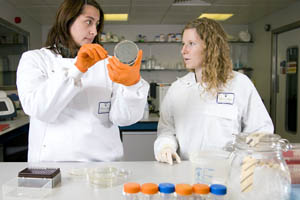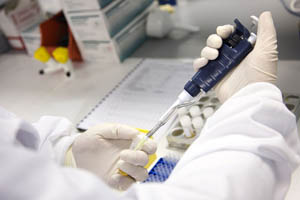Safeguarding the health, welfare and sustainability of livestock through vaccination
Published on 19 June 2011 in Food, health and wellbeing
Novel vaccine technology developed by research scientists at the Moredun Research Institute is helping Scottish producers maximise the productivity and profitability of their farmed livestock, whilst at the same time contributing towards improved welfare and sustainable livestock farming.

Key Challenges
The World Health Organisation and the Food and Agricultural Organisation estimate that a 50% increase in food supply will be needed to feed a world population of 9 billion people by 2050. There is therefore an added incentive to ensure that animal productivity is sustained in order to meet this challenge.
Key Benefits
Vaccines offer green solutions for diseases as they are sustainable, reducing reliance on pharmacological drugs and pesticides. The use of vaccines has multiple benefits such as improving animal health and welfare by controlling animal infections and infestations; improving public health by controlling zoonoses and food borne pathogens in animals; solving problems associated with resistance to antibiotics and anthelmintics; keeping animals and the environment free of chemical residues and maintaining biodiversity. All of these attributes should lead to improved sustainability of animal production and economic benefit.
Due to longstanding financial investment from the Scottish Government, Moredun Research Institute has developed an extremely strong reputation of applied research and in translating its research into practical outputs such as livestock vaccines. The impact of this work to the livestock sector is considerable: an independent report has cited that Moredun’s research will reduce the total cost of animal diseases by a quarter.
The impact of vaccine development work to the livestock sector is considerable: an independent report has cited that Moredun’s research will reduce the total cost of animal diseases by a quarter.
One of the notable success stories in recent years was the discovery by Moredun scientists of Iron Regulated Proteins (IRPs) within the bacteria Mannheimia haemolytica – the most important cause of acute pneumonia in sheep and cattle in the UK. This breakthrough led to the development of new and improved vaccines for pneumonia in sheep and cattle and today, the Heptavac P family and Bovipast are vaccine market leaders and generate over £16 million in sales annually.
Another recent success story from Moredun involves a chronic bacterial disease of sheep and goats called Caseous Lymphadenitis (CLA). The infection causes abscesses in the animal’s lymph nodes and internal organs and has both welfare and economic implications to the industry as it leads to wasting and carcass condemnation at slaughter. CLA was first recognised as a problem in the UK in the early 1990s and the disease is now considered endemic in the UK. Moredun researchers have recently identified a potential vaccine candidate which is now being assessed in clinical trials.
Haemonchus contortus (the barber’s pole worm) is the most important roundworm parasite of sheep world-wide. Fortunately for British farmers, this worm prefers warm climates and so outbreaks of Haemonchosis are only sporadic in the UK. In countries like Australia, however, strains of worm resistant to anthelmintic drugs are abundant and alternative methods of control are needed. Work at Moredun has identified a candidate vaccine for this parasite which has been tested successfully in lambs in Australia and Moredun scientists are currently working towards developing this vaccine commercially.


Comments or Questions
Related Websites
Our Partners
Moredun is grateful to the Scottish Government for their longstanding financial support. This funding has allowed Moredun to leverage additional grants from BBSRC, Wellcome fund and the EU as well as many other sources to work on vaccine development for a range of livestock diseases.
Find Out More
For more information contact Dr Colin McInnes (colin.mcinnes@moredun.ac.uk), Head of vaccine development, Moredun research Institute, Pentlands Science Park, Bush Loan, Penicuik, EH26 0PZ.Author
Dr Colin McInnes colin.mcinnes@moredun.ac.uk







